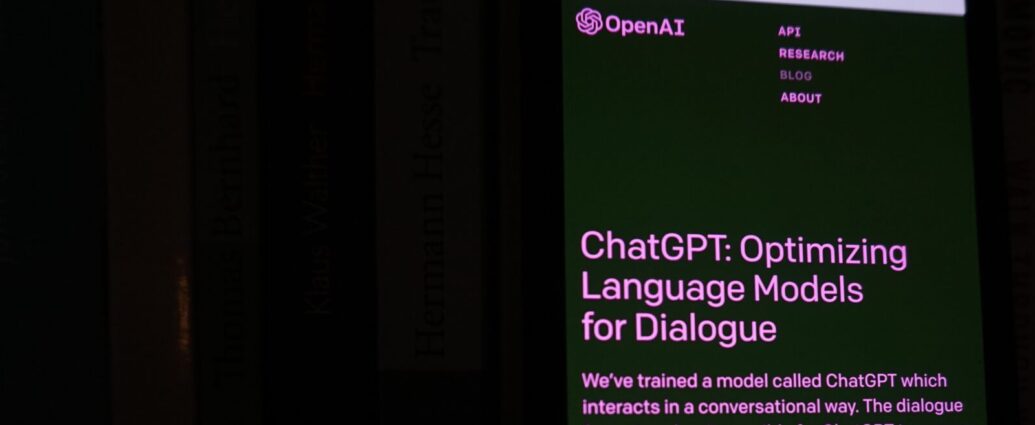Jess Parker
Overnight online sensation ChatGPT is changing the way that university students and faculty members interact with their disciplines. However, concerns about how universities should be navigating ChatGPT have been raised.
Universities across the UK must learn to work alongside AI-powered tools. They must regain control of their institutions’ academic integrity and encourage ethical uses of new technologies.
Over the past few months, various ethical considerations have been brought up in academic circles concerning OpenAI’s innovative resource ChatGPT, a language model described as “capable of generating human-like text based on context and past conversations.”
Widespread panic concerning students’ use of the website during exam season grew quickly after its release, bringing swirling accusations of plagiarism and inauthenticity concerning the next cohort of exam-takers.
“ChatGPT is a tool that tech-savvy students can use as a helpful asset…”
A survey by Intelligent.com found that nearly one-in-three college-age students reported using ChatGPT while writing their assignments. At first glance, this statement may appear concerning, drawing into question the future of written assignments altogether.
However, with further understanding and acceptance of AI learning at universities, ChatGPT is a tool that tech-savvy students can use as a helpful asset in their studies. Used correctly, ChatGPT does not undermine the longevity of their disciplines, but advances them.
Have These Hypotheticals Ever Come to Fruition?
Throughout the past academic year, there have been reports of students using ChatGPT not as a research tool, but as a means of writing entire submissions through the program.
In a BBC article, a student referred to as ‘Tom’ says he experimented by submitting two essays, one he wrote himself and one written with the help of ChatGPT.
“Tom” received a first in his ChatGPT-written essay (his highest-ever university grade) and a low 2.1 for his own work. Initially, this article seems damning for the future of essay-based subjects. However, upon further reading, this sentiment appears to be little more than fear-mongering.
Universities dealing with ChatGPT: pic.twitter.com/u9AOL0zvzR
— ɴᴀᴛʜᴀɴɪᴇʟ ʀɪᴠᴇʀs (@sophist_monster) August 11, 2023
In actuality, the student used ChatGPT in a way which furthered his own academic work rather than plagiarising an entire essay. ‘Tom’ explains: “I would prompt it with questions that gave me access to information much quicker than usual.” ChatGPT in fact assisted in the planning and framing of his argument.
ChatGPT has the capability of becoming an integral part of the research and planning stages of academic writing when used responsibly. Universities would do well to consider that now that this technology is so widely available, they cannot entirely police its use. Instead, they should learn to work alongside it and educate their students on academic integrity concerning AI.
Can ChatGPT Be Navigated With Academic Integrity?
“There will undoubtedly be teething problems. But attempts to eradicate ChatGPT in academic environments will only further its misuse”
It is shocking that OpenAI released such an intricately complex and impressive system to the general public, especially in its free form. Instead of taking advantage of this reasonably generous offering, institutions are squandering opportunities for educational growth with academic fear-mongering and an inability to coeducate alongside it.
Of course, as with the introduction of any discipline-altering advancement, there will undoubtedly be teething problems. But attempts to eradicate ChatGPT in academic environments will only further its misuse.
“Think of it like a clunky sort of study buddy; you can bounce off one another with prompts that build upon the last”
ChatGPT has the ability to work with its user to build upon their prompts and ideas. It can expand students’ learning by offering another perspective (one which happens to have access to the vast expanses of the World Wide Web). Think of it like a clunky sort of study buddy. You can bounce off one another with prompts that build upon the last, forming a conversational interaction of academic growth and AI-assisted learning.
With a willingness to adapt from both academic staff and students, universities may find subsequent ChatGPT and AI systems to be valuable tools rather than threats to the integrity of their students’ work. In turn, they will access an entirely new style of research.
READ NEXT:
-
HOW ANTI-HOMELESS ARCHITECTURE IS ANTI-HUMAN
-
VIPASSANA MEDITATION: AN ANCIENT TECHNIQUE THAT MIGHT BE OUTDATED
-
THE DOWNFALL OF ASOS
Featured image courtesy of Rolf van Root on Unsplash. No changes were made to this image. See image license here.

